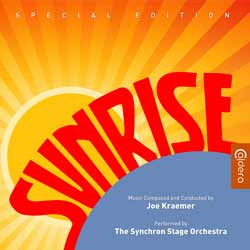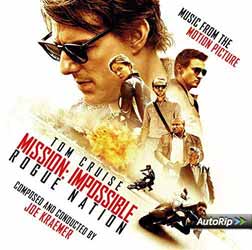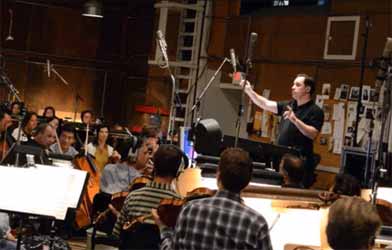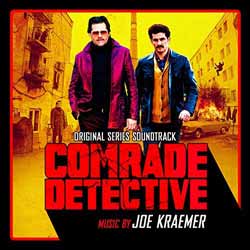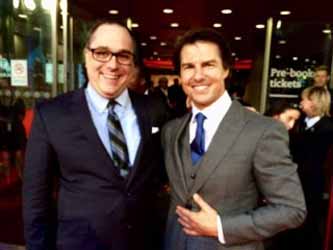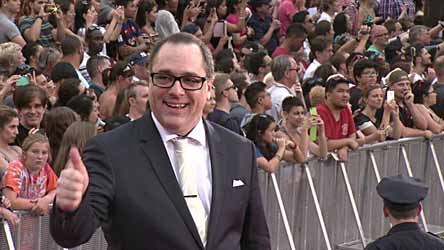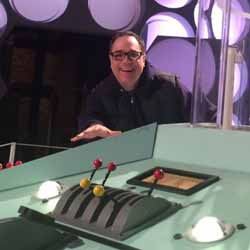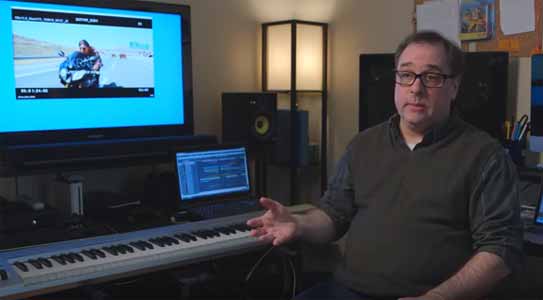|
Click here to return to the main site. Joe Kraemer (composer) - Sunrise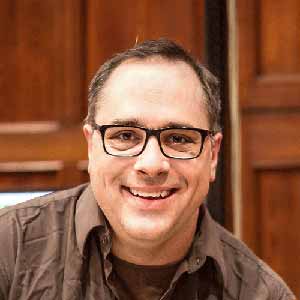 Joe Kraemer studied film composition at Berklee College of Music in Boston. Over the years, he has carved out an eclectic career, writing music for over 100 films in a variety of genres. Highlights include his scores for John Putch’s The Poseidon Adventure and A Time To Remember, as well as the Mystery Woman series. Kraemer’s close partnership with writer-director-producer Mark Altman led to him scoring the TV series Femme Fatales. In 2012, he was commissioned to score Jack Reacher by producer and star Tom Cruise. He worked again with Cruise in 2014 when the actor hired him to score Mission: Impossible - Rogue Nation. In 2016, his new score for the 1927 silent film Sunrise: A Song of Two Humans was performed to rave reviews. 2017 saw the release of the television series Comrade Detective and Creeped Out, as well as another performance of Sunrise, this time in Austria and conducted by Kraemer. Darren Rea caught up with him as Caldera Records released his soundtrack to Sunrise on CD... Darren Rea: Your soundtrack for Sunrise [1927] was recently release by Caldera Records. Can you tell us how you came to be involved in the project?
Joe Kraemer: I was first approached in the spring of 2016 by a composer named Brian Satterwhite, who has a close, ongoing association with the Dallas Chamber Symphony orchestra and its conductor, Richard McKay. Brian called me out of the blue and asked me if I’d be interested in writing a score to be performed live-to-picture in Dallas later that year, and before he’d even finished the sentence, I said yes. It turns out, even though Brian and I had been friends for years, I was reminded to him by Beth Krakower, my publicist and a great friend, who just passed away in September. This score has now become a sort of personal tribute to her, in a way, as it makes me think of her now. So upon agreeing to write the score, I spoke with Richard and narrowed down the instrumental line-up for the piece. He explained to me the logistics of what the Dallas Chamber Symphony needed, what they had for me to work with, what things the film needed due to elements seen on screen, and then gave me the freedom to write whatever I wanted within those parameters. We settled on 16 musicians: four woodwinds, four brass, five strings, piano, harp, and percussion, although initially we has conceived the piece without a percussionist. It was thanks to a last-minute sponsor that a percussionist was able to be added. When Stephan Eicke at Caldera Records heard about the project and its live premiere in Dallas, which took place in October 2016, he was very quick to express an interest in releasing it on CD. So with that in mind, I began the process of getting a version prepared that could be used in that way. It involved a new group of musicians and a new recording, made in the summer of 2017 in Vienna, Austria, and it coincided with a second performance, live-to-picture, in Baden, Austria, as part of the Hollywood Music Workshop, which I was lucky enough to conduct myself. The film’s original score was written by Hugo Riesenfeld and Ernö Rapée, had you heard that score? And how did you feel about replacing that? As a composer did you feel a little guilty about replacing them? I am going to show a little bit of my own “Hollywood” ignorance here and admit, I didn’t know anything about the movie when I was first asked about working on it, except for the excellent reputation of its director, F.W. Murnau. I immediately ordered the Blu-ray and also bought the digital version on iTunes. But then I knew I had time before I really had to buckle down on the writing, and I had a couple of other projects with pressing deadlines, so I didn’t watch it right away. In fact, I didn’t get to watch it until August of 2016. I was on my way home from my first summer teaching at the Hollywood Music Workshop in Baden and watched it on my iPad on the way home. I knew there was music on the audio track, so I just took off my headphones and watched it silent.
Much like I did with Mission: Impossible - Rogue Nation, where I decided not to go back and look at what Michael [Giacchino] or Danny [Elfman] or Hans [Zimmer] had done in previous MI movies, for Sunrise, I similarly opted not to listen to anything anyone else had written for this film. I wanted very much to have a clean slate. I don’t feel like I was replacing them, not in the same sense that, say, Michael [Giacchino] replaced [Alexandre] Desplat on Rogue One, because my score is clearly not the “official” score for the movie. The film is over 90 years old now, and no one involved with the making of the film is around anymore. Instead, I feel like my score is inspired by the film the same way Mendelssohn’s Midsummer Night’s Dream is inspired by Shakespeare, or Tchaikovsky’s Romeo and Juliet. So, no, I don’t feel bad writing a new score for a film like this. In fact, I think as the art form of film moves into its second century, we will see such revisiting continue to take place, either in the form of rescoring for live performance, or as remakes and reboots, which are already a tradition in Hollywood. How did Sunrise compare to others you’ve worked on? Did you have more time than you’d normally be afforded? And did it help that the picture was already “locked” and wasn’t going to be being edited up until the final performance? Well, I did have a nice long window from when I was first approached to when I turned in the final score. But in the end, I still wrote the final cues for the score in my usual amount of time, about three weeks. But this is sort of like the quote from Kerouac, talking about his book On The Road. Apparently, an interviewer had heard a rumour he’d written the book in two weeks. Kerouac replied, “No, I wrote the book for about 10 years. It took me two weeks to type it.” So I began coming up with ideas for Sunrise the moment I got off the phone with Richard with an instrumental line-up in mind. The decisions we made right there started the wheels in my head spinning. I knew I’d have to write a waltz, I knew I’d want a pastoral type of music, a bustling city setting of music, and such. These kind of decisions help me start to compose the material I will need to build the full score out of. So I spent the next few months keeping notes of musical ideas and thematic concepts in a journal at my piano, and when I sat down to start writing cues to the picture, I had what I call my “cheat sheet” of themes ready to go. It is always helpful when the picture itself is locked and not a “moving target” that is still changing while I’m fitting music to it. Fortunately, in the films where I’ve had to score as the picture is locking, or even before it is locked, as was the case in parts of Mission, or for much of Comrade Detective, I have a good music editor on board who can seamlessly adjust the music to fit the final edit of the film. On other projects, where the picture isn’t locked, how hard is it when the scenes you’ve already composed for are suddenly reedited? And does that happen often?
Yeah, as I say, often the only solution is to have the recording edited to fit the final lock. This happened on Mission and Comrade Detective, and in each case, a very capable music editor was able to make seamless edits to the music so that as you’re watching the program, you don’t notice the changes. For the soundtrack albums, I used the pieces that way I originally wrote them, although in some cases, made edits to be able to fit as much music as I could on the albums. How did you come to be approached by Caldera Records and how did you decide which music would make it onto the CD? I first met Stephan Eicke at Caldera in July 2015 in London, just as Mission was coming out. We became friends, and a year later, he interviewed me for a book he’s working on about film music. During the interview, I mentioned the Sunrise project, which had just had its premiere in Dallas, and he was immediately interested in the possibility of releasing it. At the same time, I was involved with the Hollywood Music Workshop in Austria. I had taught my first class there in the summer of ’16 and was preparing material for my second summer in ’17. One of the things the HMW does every year is a public event for the people of Austria, and I pitched an idea to them of doing Sunrise live-to-picture in a public performance. Since the piece had a relatively small instrumental lineup and the license to project the film was within our means, it seemed a good fit for the Workshop. My ulterior motive was that, if I could get a couple of rehearsal in before the live performance, which was covered by the Workshop’s budget for the concert, I could then hire the same musicians to go into the studio with me and record the score and get the whole thing done in less time, keeping the cost within my mean, as the recording was self-financed. The third prong of this was the incredible support of Herb and Sabine Tucmandl, who operate the Synchron Stage in Vienna, the recording studio where I had done Comrade Detective as well as the student projects for the Workshop. They came aboard the project as producers, and without them it would not have been possible for me to get the amount of time I needed to record the score the way I was ultimately able to. As far as the decision of what to include, the intention, after discussions with Stephan, was that an hour of the score would be ideal, and that we would include the traditional Caldera “composer’s commentary” in the remaining time on the CD. It turned out that the amount of music I ended up being able to record in the time I had available at the studio was about an hour. So I just tried to pick the pieces that told the story of the film and the score, and cut the pieces that I felt, which necessary for the live-to-picture performance, could be dropped from the CD without negatively impacting the listener’s emotional understanding of the story. There are a few parts of the film that feel kind of episodic, and although they are delightful and please the audience at a screening, omitting them from the CD didn’t seem to hurt to arc of the album. Your score for Comrade Detective has also just been released. How does working on a TV series differ from working on a film? And how do you stop yourself getting in a rut and finding it hard to keep the music fresh and engaging?
Trying to keep things fresh and engaging is the name of the game for me. It’s sort of the number one job requirement. I study a lot of “Theme and Variations” from the classical repertoire, I listen to a lot of cover versions of songs to hear how different people change things from version to version, and I look at how John Williams keeps things fresh in his terrific sequel scores, from Jaws 2 right up to The Last Jedi. As I’ve gotten older, I’ve come to look at a lot of film composing as arranging work more than composition work, and I try very hard to keep developing my skills as an arranger to that end. A great example might be Darth Vader’s theme, which was first written for The Empire Strikes Back in 1979 or ’80, as an evil, military march. By the time Darth Vader dies in Return of the Jedi (spoiler alert), the theme had become so well-known, that Williams could hint at it in pretty oblique ways and the audience would still make the connection. I mean, when Luke takes Vader’s helmet off and we see the sad, old man behind the mask, the theme, which actually outlines a major triad over a minor root, is played slowly in the high register of the harp in a related key that gives a sad, rather than sinister, quality. It’s arranging “tricks” like this that I keep in mind as I search for ways to keep the music fresh. The biggest differences between TV and film are the schedule and the budget. In fact, Comrade was much closer to a movie in terms of my workflow than a TV series. Since Comrade was a show made for streaming services, we were working on all six episodes at once. As a result, I was able to amortize the budget in such a way as to write all the music for the entire series and record it in a marathon two days in Vienna all at once, rather than episode by episode over the course of a season. Later that same year, 2017, I scored a show called Creeped Out for the BBC, which was 13 half-hour episodes, and that series was the more traditional TV schedule, which was one episode at a time, sequentially. The schedule and budget of that were such that I couldn’t bunch everything up and do it with live musicians all at once. Instead, I had to do it one show at a time with samples and soloists. Funnily enough, both of the TV series that I scored in that traditional episodic way (Creeped Out and Femme Fatales) were anthology shows with very little connection from episode to episode, while Comrade, which was much more connected throughout, I scored like a movie. Interesting…. For me, a lot of the joy I get from hearing your work is that it reminds me, in essence, of some of the great scores that were around in the ‘80s and ‘90s. Which film composers have inspired you over the years? Of course, the most important and obvious, is John Williams. I also love Jerry Goldsmith, David Shire, Elmer Bernstein and Bernard Herrmann. I hear a lot of John Barry in my work, even though I never think of myself as being influenced by him on a conscious level. I also love The Beatles and McCartney, Randy Newman, Paul Simon, and Brian Wilson, and apply a lot of what I like about their pop music to my film work, believe it or not. These influences all sort of swim together in my head and what you hear is the result. When you’re composing is it important to you have it can be listened to by people that haven’t seen the film? That it should stand as a beautiful score in its own right?
I am very familiar with the argument that film music doesn’t need to be interesting in its own right, that it really only exists to support the movie, that “how it works in the film” is all that matters. In my career, I’ve written scores that don’t really do much on their own, that really only come to life when they are married to the picture. But I kind of think, why not try and make it interesting on its own too? I mean, why not at least try? Now, I was very lucky to have [Tom] Cruise really championing the approach I took to the scoring for Mission, which is kind of anachronistic to the way people are scoring movies these days, very thematically, full of motivic writing, counterpoint, very melodic! The result of that has been a freedom to continue to do that in the projects I’ve been hired for since, and I think it’s also scared away filmmakers who are more comfortable with music that works as sound design, what my friend Frank Ilfman calls “air conditioning”. And of course these things movie in cycles. In the mid ’60s, with The Graduate and then Easy Rider a few years later, orchestral scoring fell out of favour in Hollywood, and song scores were all the rage, and it wasn’t until Jaws that symphonic scoring kind of made a comeback, and then Star Wars really brought it back in a big way. I guess the bottom line is, I don’t want to be bored writing or listening to my music, and I don’t want the audience to be bored listening to it, and I work really hard to try and make that happen. If one of your pieces could be buried away, to be unearthed by your great great grandchildren in years to come, what piece would you like them to hear? Do you mean a piece that no one has heard? Or something that I’ve done that is out there that I hope withstands the test of time? I’m very proud of 'Solomon Lane’s Theme' from Mission. I am still quite fond of the 'End Titles' from The Way of the Gun. I’ve made a concert suite of music from Jack Reacher that I am very happy with. I guess the work that most typifies who I’d like to be remembered as though is Sunrise, at least so far. When you’re working on a project, do you prefer working with a director who wants to be heavily involved in the music (because they care about the music) or one that doesn’t really understand the process so just lets you get on with it with as little interference as possible? Both of these situations have their benefits and drawbacks for me as a composer. Certainly a director who cares about the music is a good thing, because it means the music has a chance of surviving the editing and mixing process and making it into theaters in a positive way. But I also respect someone who delegates to the qualified people s/he hires, and let’s me do my job to the best of my ability. The most difficult is a director who THINKS they know music but don’t, like the one who once told me “this scenes takes place in France, so we should use French Horns”. To which I silently thought, “so do the characters only eat french fries and french toast in this scene, then, too?”.
My favourite way to work is to meet with the director and discuss the movie conceptually, to break it down as a story, to analyse the characters and their motivations, to discuss the tone of the film, and to work out with the director the emotional arc they intend for the audience. Then I would go away and come up with thematic material for a few weeks. Once I have that worked out, I would have a meeting with the director where I would present this material on the piano, away from the picture, and have more discussion about the direction I’m heading. After that, I would revisit and revise any thematic stuff the director asked, and then begin scoring the movie “in earnest”, as I say, which is writing the actual cues to picture. I would write somewhere between a third and half the score this way and then have a show-and-tell with the director, where I play the mockups of the cues against picture with the rough sound mix, and get feedback about the music to make final revisions. Hopefully by now, I’m confident in the direction the score is heading, the director and I are on the same page, and I can finish out the rest of the cues with fewer notes and revisions as we enter the finishing stretch on the scoring of the movie. This is pretty much the way things worked on Jack Reacher, Comrade Detective, and The Man Who Killed Hitler and Then The Bigfoot. Once the score is recorded, I then surrender my work to the director the same way an actor surrenders his performance to a director once the movie has been shot. Harrison Ford may think his performance was better in take 2 of a shot, but the director prefers take 3. That is the director’s prerogative, it’s his or her job in fact!. So I write and record the score the way I feel it based on the work I did with him or her during the composing and scoring process. After that, I let it go and give the director my blessing to mix it and edit as they need to in order to fit their film. If they really feel like a cue written for one scene actually works better somewhere else, that again is their prerogative. If they think a scene I scored works better without music, or vice versa, that is their decision to make as director of the movie. I look at the soundtrack album as the place where I can make my definitive, personal statement as the composer for the movie. In the broadest, kindest terms, the score in the film is for them, the soundtrack album is for me. Is there any sort of musical project that you haven’t tackled yet that you’d love to have a go at? It’s no secret I’d love to work on a Star Wars project some day. I came really close, actually, a few years ago, but alas, it wasn’t to be. Not the right time yet. But much like Pierce Brosnan lost Bond to Timothy Dalton only to get the part a few years later, I think it’s possible the wheel will come back around at some point. Who knows, maybe not. I really enjoy scoring story-driven projects lately, rather than action-driven material. The action stuff is a lot of fun, but it’s been nice switching gears as I have since Mission and writing for story and character more than action set-pieces. Animation is perhaps that only arena right now that really still embraces the kind of scoring I really love, the melodic, orchestral stuff, the music with a tune! So I’d really love to do an animated feature. I’ve done some really powerful animated shorts, and that work has been very rewarding. What are you working on at the moment?
I have been a fan of Doctor Who since I was a kid, and after Reacher I became friends through social media with a couple of film music fans who also happen to have worked on Doctor Who. So through those relationships, I was able to work for a company called Big Finish, which makes Doctor Who audio drama, which is essentially all the work I do for movie, minus the visual component. These are 90-to-120 minute programs that have full casts, cinematic sound design, and proper scoring. They aren’t audio books, they are truly like watching a movie with your eyes closed. I’ve done over a dozen scores for them since, and they continue to be an ongoing composing opportunity for me, and I hope to keep doing them as long as they keep offering them. I’m also looking forward to scoring a film called Faunutland and the Lost Magic by a terrific writer-director from Sweden named Marcus Ovnell. They finished shooting about a month ago and are putting the first cut together now. I think there will be quite a lot of post-production visual effects so it’s a little ways off until I get involved, but I’m very excited about it. It’s a family-oriented film, and Marcus and I share a common love for things like Star Wars and Harry Potter, so I think we’ll be having a lot of fun with that one. There is also a really interesting script I’ve read by Thomas Ikimi, who I’ve worked with a few times now, and we’ve begun writing music for that. This project is different from most in that he’s convinced me to write music based on the script, which I almost never do. But he’s come up with a compelling reason to do so, and it’s been an exciting process so far. It will be interesting to see how much the music I’ve written influences things on the set as they shoot, how much it works in the editing process, and how much I may end up redoing from scratch once the film is cut. That’s the fun thing about this job, is that it constantly challenges and inspires, and that it’s never the same thing twice.
Click here to visit Joe Kraemer's official website Click here to keep informed of Caldera Records' latest releases This interview was conducted on 22 October 2018 Return to... |
|---|
